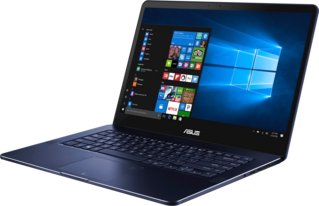Asus VivoBook Pro 15 (N580) 15.6" vs Asus ZenBook Pro UX550
Hello, laptop lovers! We're putting the Asus VivoBook Pro 15 (N580) and the Asus ZenBook Pro UX550 under the microscope. Both models boast top-notch features and performance, but choosing your tech companion goes beyond that. We're here to dissect their strengths and weaknesses - from processing speed to aesthetic design - guiding you towards an informed choice. Are you leaning towards the VivoBook Pro 15 with its powerful Intel Core i7-7700HQ processor and generous storage? Or is the ZenBook Pro’s sophisticated design and advanced features more your style? Let's uncover their secrets!
System and application performance
Performance in popular 3D games
Viewing angle, color accuracy...
Ports, webcam and other interfaces
Potential battery life
Materials, durability and portability
Performance Comparison
| Asus VivoBook Pro 15 (N580) 15.6" | Asus ZenBook Pro UX550 | |
|---|---|---|
| Geekbench 5 Multi | 3207 | 3207 |
| Geekbench 5 Single | 852 | 852 |
| Passmark | 6953 | 6953 |
| Passmark Single | 2069 | 2069 |
| Cinebench R20 Multi | 1701 | 1701 |
| Cinebench R20 Single | 390 | 390 |
| Blender | 506.78 | 506.78 |
Comparing the performance of the Asus VivoBook Pro 15 (N580) and the Asus ZenBook Pro UX550 involves analyzing performance benchmarks to gauge how their hardware specs impact everyday tasks and applications.
Geekbench 5 Multi-Core Score:
- Asus VivoBook Pro 15 (N580): Scores 3207.
- Asus ZenBook Pro UX550: Achieves a multi-core test score of 3207.
Geekbench 5 Single-Core Score:
- Asus VivoBook Pro 15 (N580): Achieves a single-core test score of 852.
- Asus ZenBook Pro UX550: Scores 852 in the single-core benchmark.
Passmark Performance Test:
- Asus VivoBook Pro 15 (N580): Achieves a Passmark total score of 6953, including a single-core score of 2069.
- Asus ZenBook Pro UX550: Achieves a Passmark score of 6953 and a single-core score of 2069, reflecting its strong performance.
Cinebench R20 Benchmark:
- Asus VivoBook Pro 15 (N580): Achieves a multi-core score of 1701 and a single-core score of 390.
- Asus ZenBook Pro UX550: Reflects similar results with a multi-core score of 1701 and a single-core score of 390.
Blender Rendering Performance:
- Asus VivoBook Pro 15 (N580): Shows Blender rendering speeds at around 506.78.
- Asus ZenBook Pro UX550: Also demonstrates comparable Blender rendering performance at approximately 506.78.
By analyzing these benchmarks, we find that both laptops exhibit almost identical performance metrics across various tests. This parity suggests that for general computing tasks, such as web browsing, document editing, or multimedia consumption, users would experience similar speed and responsiveness on either device. When it comes to more demanding applications like design software or content creation tools that rely heavily on CPU performance, both laptops show robust capabilities.
In real-world scenarios, this means that whether you're engaged in professional design work necessitating quick rendering speeds or enjoying immersive gaming experiences requiring high frame rates, both the Asus VivoBook Pro 15 (N580) and Asus ZenBook Pro UX550 can handle these tasks admirably without significant differences in performance outcomes.
Design Comparison
Size Comparison
Comparing the Asus VivoBook Pro 15 (N580) and the Asus ZenBook Pro UX550 for design elements that improve user experience, various factors address diverse user requirements.
Design Elements Comparison:
Weight and Portability:
- The Asus ZenBook Pro UX550 weighs 4 pounds, lighter than the Asus VivoBook Pro 15 at 5 pounds, enhancing portability for users who value mobility.
Dimensions:
- The Asus ZenBook Pro UX550 is a bit smaller and thinner than the VivoBook Pro 15, measuring 14.4 x 9.9 x 0.7 inches versus the VivoBook's 15 x 10.1 x 0.8 inches. This variation might interest users seeking a slimmer and more portable laptop.
Keyboard:
- Both laptops come with backlit keyboards, making them easier to use in low-light settings. However, the typing experience may vary depending on individual preferences for key travel and feedback.
Material and Build Quality:
- Both laptops are anticipated to have sturdy construction, as is characteristic of Asus products. The selection of materials not only affects durability but also plays a role in the overall appearance, ultimately affecting user satisfaction.
Unique Design Features:
- The Asus ZenBook Pro UX550 is notable for its touch screen feature, providing a versatile way of interacting for creative professionals or users who appreciate a tactile interface in addition to conventional input methods.
- The VivoBook Pro 15 stands out with a fanless design, offering quieter operation for less demanding tasks.
User Experience Implications:
Students:
- Students who prioritize both performance and portability may find the ZenBook Pro UX550 appealing due to its lightweight and slim design, ideal for moving between classes or study sessions.
Professionals:
- Professionals who prioritize versatile input options may appreciate the touch screen feature of the ZenBook Pro UX550 for presentations or creative work.
Aesthetic Appeal:
Both laptops have sleek designs with thin bezels and clean lines, catering to users who prefer a modern look in their tech gadgets.
Conclusion:
In conclusion, while the Asus VivoBook Pro 15 (N580) offers robust features like a fanless design suited for quiet operation, the Asus ZenBook Pro UX550 shines with its touch screen functionality and lighter build.
Screen Comparison
| Asus VivoBook Pro 15 (N580) 15.6" | Asus ZenBook Pro UX550 | |
|---|---|---|
| Resolution | 4K | QHD |
Comparison of Screens: Asus VivoBook Pro 15 (N580) vs. Asus ZenBook Pro UX550
When selecting a laptop, the screen is a vital element that impacts various tasks, from gaming to professional graphic design. To assist you in making an informed decision, let's compare the screen features of the Asus VivoBook Pro 15 (N580) and the Asus ZenBook Pro UX550.
Screen Size:
- VivoBook Pro 15 (N580): 15.6 inches
- ZenBook Pro UX550: 15.6 inches
Both laptops feature a standard 15.6-inch screen, offering a good balance of portability and an immersive viewing experience.
Resolution:
- VivoBook Pro 15 (N580): 3840 x 1080 px
- ZenBook Pro UX550: 2560 x 1440 px
The VivoBook offers a superior resolution, delivering sharper images and more detailed visuals than the ZenBook. This enhancement can greatly improve your gaming experience or boost precision in professional graphic design tasks.
Pixel Density:
- VivoBook Pro 15 (N580): 282.4 ppi
- ZenBook Pro UX550: 188.3 ppi
With a higher pixel density, the VivoBook offers crisper text and images, making it ideal for tasks that demand clarity and detail, such as video editing or content creation.
Display Technology:
- Both laptops have IPS LCD LED-backlit displays that deliver vibrant colors and wide viewing angles, providing an immersive visual experience.
Touch Screen:
- ZenBook Pro UX550 comes with a touch screen feature, adding versatility to your interactions with the laptop. This can be advantageous for creative professionals who require precise control in design applications.
Anti Reflection Coating:
- The VivoBook Pro 15 (N580) includes an anti-glare coating to reduce screen reflections, improving visibility in bright environments for outdoor or well-lit office settings.
Supported Displays:
- Professionals working on multiple projects simultaneously can benefit from the enhanced multitasking capabilities of both laptops, which support up to three external displays.
To sum up, the Asus VivoBook Pro 15 (N580) offers high resolution and pixel density ideal for tasks such as graphic design or gaming, whereas the Asus ZenBook Pro UX550 shines with its touch screen functionality tailored for creative professionals needing accurate input methods.
Hardware Comparison
| Asus VivoBook Pro 15 (N580) 15.6" | Asus ZenBook Pro UX550 | |
|---|---|---|
| RAM | 16GB | 16GB |
| Storage Size | 2512GB | 1000GB |
Comparing the hardware aspects of the Asus VivoBook Pro 15 (N580) and the Asus ZenBook Pro UX550 involves analyzing crucial components like the CPU, GPU, and RAM to assess their influence on daily tasks such as multimedia activities and running resource-intensive software. Let's explore each laptop's specifics to assist you in making a well-informed choice.
Asus VivoBook Pro 15 (N580)
CPU:
- Featuring an Intel Core i7-7700HQ processor clocked at 2.8GHz
- Turbo Clock Speed: 3.8GHz
- Cpu Speed: 4 GHz
- Maximum Memory Bandwidth: 34.1
GPU:
- Integrated Graphics
- Supports DirectX 12
RAM:
- 16GB DDR4 @ 2400 MHz
Storage:
- Flash Storage: Yes
- Internal Storage: 2512GB (512GB SSD + 2000GB HDD)
Other Features:
- Cpu Threads: 8 threads
- Memory Channels: Dual-channel (2)
- PCI Express Version: PCIe 3.0
- Thermal Design Power: 45W
- Memory Slots: 2
Asus ZenBook Pro UX550
CPU:
- Intel Core i7-7700HQ
- Turbo Clock Speed: 3.8GHz
- Cpu Speed: 4 GHz
- Maximum Memory Bandwidth: 34.1
GPU:
- Integrated Graphics
- Supports DirectX 12
RAM:
- 16GB DDR4 @2400 MHz
Storage:
- Flash Storage: Yes
- Internal Storage:1000GB SSD
Other Features:
- Cpu Threads: 8 threads
- Memory Channels: Dual-channel (2)
- PCI Express Version: PCIe 3.0
- Thermal Design Power:45W
Performance Comparison:
Both laptops feature the Intel Core i7 processor, providing powerful performance for multimedia tasks and demanding applications.
- The VivoBook Pro offers increased storage capacity with both SSD and HDD, allowing quicker data access and ample file storage.
The ZenBook Pro stands out with its single high-speed SSD storage option, leading to faster boot times and application loading.
Conclusion:
If you prioritize storage capacity and versatility in your computing experience, the Asus VivoBook Pro N580 might be your ideal choice with its dual storage options.
Users looking for quick and agile performance in their daily tasks will find the Asus ZenBook Pro UX550 to be a standout choice due to its high-speed SSD configuration.
In conclusion, both laptops provide powerful hardware configurations ideal for multitasking and content creation. Choose based on your storage preferences and performance expectations.
Verdict
Why Asus VivoBook Pro 15 (N580) 15.6"?
- The Asus VivoBook Pro 15 (N580) offers dual storage options for increased storage capacity.
- It features a fanless design for quieter operation during less demanding tasks.
- The VivoBook Pro N580 provides better resolution and pixel density for enhanced visual clarity.
- It has higher Geekbench 5 multi-core and single-core scores compared to the ZenBook Pro UX550.
Why ?
- Lighter weight and slimmer design for improved portability.
- Touch screen feature for versatile input options, ideal for creative professionals.
- Higher screen resolution and pixel density for crisper visuals in tasks like graphic design and gaming.
Similar comparisons
- Asus VivoBook E200HA 11.6" Intel Atom x5 Z8300 vs Samsung Chromebook 4 11.6" Intel Celeron N4020
- Asus TUF Gaming FX705 17.3" Intel Core i5-8300H vs Lenovo ThinkPad E450 14" Intel Core i3-4005U
- Asus Transformer Book T100TA 10.1" Intel Atom Z3740 64GB vs Asus Transformer Book T100TAF 10.1" Intel Atom Z3775
- Asus G751JY 17.3" Intel Core i7-4710HQ vs Asus ROG GL552 15.6" Intel Core i7 6700HQ
- Asus TUF Gaming FX705 17.3" Intel Core i5-8300H vs Lenovo IdeaPad S340 15.6” Intel Core i7-8565U

